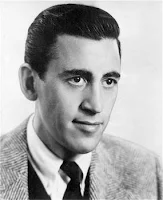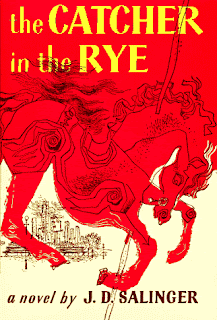“The Catcher in the Rye” by J.D. Salinger – Phony Adulthood
The Catcher in the Rye by J.D. Salinger has become such a highly-praised novel that it has even been made into a mandatory reading for various school systems around the world. However, despite it being seen as one of the greatest classics of literature, there are many, many people who see this book as being boring and unworthy of its status.
Well, everyone is certainly entitled to their opinion, but the problem, the way I see it at least, is that most people don’t really have any well thought-out arguments to support their complaints of the book being boring.
In most cases, from what I understand at least, it revolves around a lack of action and plot, an inability to identify with the main character, and a dissatisfaction with how Holden thinks of the people around him, spending most of his time whining and thinking everyone but him is a phony.
In most cases, from what I understand at least, it revolves around a lack of action and plot, an inability to identify with the main character, and a dissatisfaction with how Holden thinks of the people around him, spending most of his time whining and thinking everyone but him is a phony.
Well, let’s address those issues one by one, starting the lack of action. Yes, it is true that in the traditional sense of it, this book does lack action. However, the point of this book was never to be an action novel, nor was I aware that every single piece of literature ought to be judged by the amount of action in it.
The Catcher in the Rye is a character study, one that looks into the thoughts and actions of a sheltered teenager who brutally thrusts himself into the unforgiving adult world. This actually also addresses the plot issue mentioned above; this is about the process itself, not the destination. No, there isn't any cookie-cutter story with clearly-outlined good and bad guys… and thank God for that, because I’m sure you’ll agree we have more than enough of those already.
As far as the inability to identify with the main character does… well, who said you have to identify with the main character in order to enjoy a book or a story? Once again, this book is more of a character study than anything else, and Holden is a very complex, multi-dimensional character who is best enjoyed when observed from the outside. In other words, the reader is meant to analyze Holden and his behavior; finding him or herself in it would just be a sort of bonus, for lack of a better word.
Finally, let’s have a talk about Holden’s thoughts and actions. Yes, he does seem like a presumptuous twat with a superiority complex… but let’s face it, that description fits about half of the teenager population. It is very possible that certain people do not like it because deep down, they can identify themselves with Holden, and they hate it… but I’m kind of straying from the point.
The Catcher in the Rye is a character study, one that looks into the thoughts and actions of a sheltered teenager who brutally thrusts himself into the unforgiving adult world. This actually also addresses the plot issue mentioned above; this is about the process itself, not the destination. No, there isn't any cookie-cutter story with clearly-outlined good and bad guys… and thank God for that, because I’m sure you’ll agree we have more than enough of those already.
As far as the inability to identify with the main character does… well, who said you have to identify with the main character in order to enjoy a book or a story? Once again, this book is more of a character study than anything else, and Holden is a very complex, multi-dimensional character who is best enjoyed when observed from the outside. In other words, the reader is meant to analyze Holden and his behavior; finding him or herself in it would just be a sort of bonus, for lack of a better word.
Finally, let’s have a talk about Holden’s thoughts and actions. Yes, he does seem like a presumptuous twat with a superiority complex… but let’s face it, that description fits about half of the teenager population. It is very possible that certain people do not like it because deep down, they can identify themselves with Holden, and they hate it… but I’m kind of straying from the point.
Holden is used an experimental vehicle to demonstrate what happens when shielded and carefree adolescents who think themselves better than the world are fed a highly potent dose of harsh reality. What happens when they are thrust into the adult world and left to fend for themselves.
I think that the massively-negative attitude towards the book has originated because it is forced upon teenagers, who as we know, are far more interested in simplicity, immediate rewards and action rather than a slow and thought-provoking character study.
Reading it as an adult provides an entirely different perspective on everything, mostly because you can find yourself in the story, in the experiences described without necessarily identifying yourself with the character, if that makes any sense. No, it probably won’t change your life or open your eyes to some kind of truth you were oblivious to, but as all good books, this one will definitely leave its mark on you, should you approach with the right mindset that is.
 | Jerome David Salinger(January 1, 1919 - January 27, 2010)Personal site Jerome David Salinger, better known as J. D. Salinger is a highly-praised American writer whose many works, starting from his early ones, have earned him much acclaim. His great classic The Catcher in the Rye remains one of those immortal works of literature, though he certainly had many others that put him on the pantheon of history's greatest writers, such as Nine Stories and Franny and Zooey. |







Some good reasons why should consider the book good. I agree that it is, indeed, a good book!
ReplyDeletePerhaps you could extol the virtues of the novel and let people begin to see how it really is interesting and not at all boring. You did that, but you did it in a way that argues with why it isn't boring, and I'm not sure that is as effective.
After all, I'm like you, and I want people to like the book!
I enjoyed your review, and I will tweet it, if that is okay.
Hello Dr. Chad, I am glad that you liked my take on the book, and as to why my argument was based on the book not being boring, I guess I have to attribute it to the onslaught of negative reviews I recently read which claimed the opposite.
DeleteAlso, by all means, tweet it at your leisure.
-Best Regards, David
I'm reading it again as it went on sale at Barnes and Noble as a summer sale. It's as terrific as I remember it and plan to lend it out when I'm finished. Maybe I'll get my book club to read it. I don't know how many have read it but it's an important book and several have teenagers and most have had them. ALL enjoy good literature so it should be a good choice. Thanks for the review.
ReplyDeleteThanks for the comment Linda, this may be a good fit for the book club, especially since most of us have had our first encounter with this novel back in school when we were too young to appreciate it in its entirety.
ReplyDelete